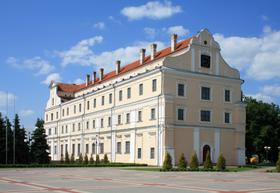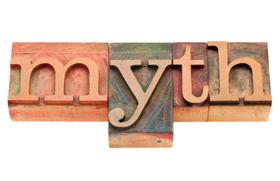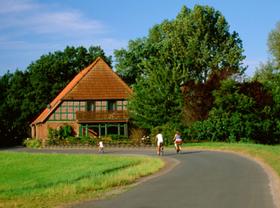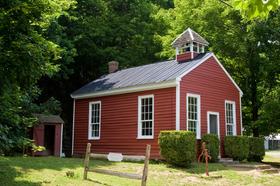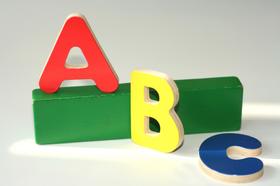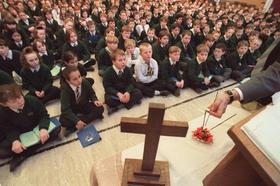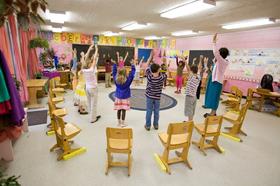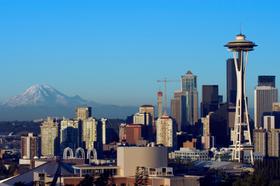Private K-12 schools are non-public schools. In other words, they are not part of the public K-12 education system. While private schools are regulated in the same way most businesses are with respect to safety, zoning and registration, they are not required to do many of the things public schools must do such as state testing and accepting any student who applies.
First, let's take a quick look at the history of K-12 education in the United States of America. What were the first colonists were up against as far as education was concerned? The challenges were enormous simply because there was nothing here. Native Americans did not have school buildings. They educated their offspring in their natural surroundings. The colonists, on the other hand, had left a country with an organized educational system. For example, King's School, Canterbury, opened its doors in 597. In the Middle Ages, the kings and queens of England established schools and universities to educate young men. In most cases, these educational establishments were founded to educate and train clergy, judges, and other public officials. Edward VI set up free grammar schools which were open to all, regardless of religious beliefs or ability to pay. Many of the great cathedrals and abbeys had choir schools where they provided for the education of boys.
Leaving a country with a long history of education, the earliest settlers in America arrived here in the early part of the 17th century and very quickly and resolutely set about providing schools. Since these men and women were Puritans who were fleeing religious persecution in England, their religious views shaped everything in their new world, schools included. Boston Latin School opened in 1635, the year before Harvard University was founded. These schools trained religious leaders, members of the legal community and government officials.
This video describes schools in 18th-century Boston.
As you can see, private K-12 schools have been around in the U.S.A. since colonial times. Public schools are a comparatively recent development which dates from the middle of the nineteenth century.
The technical definition of a private school
Here are the definitions which a couple of states offer. If you want to see how a state which is not shown below defines private schools, use this search string: "state of _______ definition of a private school" Typically you will see the state department of education at the top of your search results.
The State of California defines a private school as follows:
"A private school is a private business or nonprofit entity that offers or conducts full-time instruction with a full complement of subjects at the elementary, middle, or high school level. Private schools function outside the jurisdiction of the California Department of Education (CDE) and most state education regulations. Private schools do not participate in California’s educational accountability system and are directly accountable to students and their parents or guardians, based on the terms of the private school enrollment contract."
Information on the definitions of public and private schools is on the CDE Web page Definition of a School.
The State of Wisconsin offers a typical look at private schools from the regulators' perspective: "The statutory definition of a 'private school' allows for some variation in curriculum and organizational structure. However, numerous state statutes and administrative rules affect how a private school can administer the curriculum, employee regulations and protections, student health services, facilities, enrollment reports, pupil records, special education, and transportation."
Private schools are regulated but independent
While private schools are subject to all applicable local, state and federal laws and regulations governing the business side of things, private schools handle educational matters according to their educational philosophy and the wishes of their families and students. The essence of a private school is its curriculum and how it chooses to teach that curriculum is a matter which it decides in consultation with its clientele. The market drives private schools. That is why you will find so many religious schools emphasizing their religious instruction. And they can do that with impunity because they are private and that is the focus which their clients want them to have. That is why some schools have adopted a progressive approach, and still others have selected a traditional approach. The wide variety of educational philosophies, curricula, and teaching methods is one reason why I can confidently tell you that there is a private school out there which will be an excellent fit for your needs and requirements. You simply have to take the time to look for it.
Tax status of private schools
Most private schools are incorporated as non-profit entities with the specific purpose of operating a school covering specified grades. Non-profit private schools have tax-exempt status under 501 (c) (3) of the tax code. Your gifts to tax-exempt private schools are deductible on your tax return to the extent permitted by law. For private schools having the ability to raise money through tax-deductible contributions is an important component in their fund-raising activities.
Funding of private schools
Private schools are funded by tuition fees, income from endowments and gifts from individuals and businesses. By way of contrast, public schools are funded, for the most part, by tax dollars at the local, state and federal level. A very small percentage of public school operating funds come from foundation grants and private donations. Voucher programs are the only source of direct public funding which you will find in private schools. The essential characteristic of private schools is that they are unique. No two private schools are exactly the same. They may perhaps use the same approach to teaching and philosophy, but they are unique. Each school's governing body determines what happens in the classroom, when it happens, where it happens and when it happens.
This video looks at Lake Hill Prep.
Management of private schools
Most private schools have some sort of management structure in place. Typically it consists of a rotating board of trustees which oversees development activities and the prudent management of the institution's financial resources and physical assets. Reporting to the board is the head of school who is responsible for the day-to-day operations of the school.
Public schools are aggregated by districts. The local voters elect members of district boards of education. The funding for the district's budget comes from tax levies on real property, for the most part. A superintendent takes care of the day-to-day operations of the overall district.
Questions? Contact us on Facebook. @privateschoolreview













